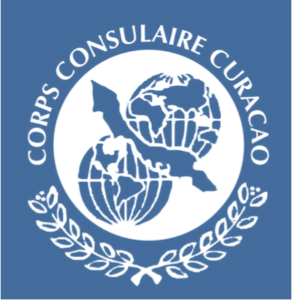CELEBRATION 75TH ANNIVERSARY CORPS CONSULAIRE CURACAO
Speech Mr. Karel Frielink – Dean of the Corps Consulaire Curaçao
Ladies & Gentlemen. Good evening and welcome!
On behalf of the Corps Consulaire Curaçao, it is an honor to address you all on the celebration of the seventy-fifth anniversary of the Corps Consulaire Curaçao.
On the 22nd of April 1944, during World War II, a consular star was born. Not much is known about the first decades of the Corps.
What we do know however, is that at the very start of WW II, several Dutch consuls and consuls of other countries such as France, Lithuania and Poland, issued so-called “Curaçao visas” to help escaping refugees. (Note 1) Apparently, it was only possible to get to neutral Portugal and to obtain a Portuguese transit visa if one had a visa to an overseas destination. It is almost for sure that those consuls were not authorized to issue “Curaçao visas”, but for sure their leniency towards refugees reflected the Dutch Government’s policies, whose Government at the time was in exile in London. (Note 2)
I am not going to discuss the tasks of honorary consuls and career consuls, but I would like to use this one example to show that they are sometimes badly needed. And that under circumstances, courage may be required to help people in need.
Rules are important and must be observed, but sometimes, under exceptional circumstances, this is not possible. In the present time, there are also political and other refugees. Fortunately, there are now treaties that, to a certain extent, offer protection to them. But let’s be honest: when you see how some refugees are living and trying to survive, you should be thankful not to be in their situation.
But we’re here to celebrate a birthday. And so my speech shouldn’t be too dark. I would like everyone to go home tonight with a good feeling. But I’m not gonna tell any jokes either. I’m not very good at inventing them in advance. Besides, if I start making too many jokes I may be seen as a joke myself. You might like that, but it’s at my expense.
Did you know that the U.S. Consulate opened its doors in Curaçao in 1793? That is about 17 years after Sint Eustatius as the first foreign entity formally recognized U.S. sovereignty when an U.S. flagged ship was saluted with a 13-gun salute, a salute bestowed only upon sovereign flags. (Note 3) It would then take another 151 years before the Corps Consulaire Curaçao was established.
Just one other historical fact. On 19 May 1943, a proposal was submitted in Curaçao to extend the exemption from import duties for consular officials of foreign countries. The exemption included everything that the consul in question imported personally and in his capacity as consul, including what he needed for official receptions, such as alcoholic beverages. The exemption had retroactive effect to the 16th of May 1943. On the question of why the retroactive effect was to be applied, it was answered by the Government that this date had been chosen in order to allow the British Consul to benefit from the new exemption with regard to the reception on the occasion of the celebration of the anniversary of the British King’s birthday. (Note 4) The British Consul will undoubtedly have been very grateful to the Curaçao legislator.
The fact that there is a Corps Consulaire in which more than 30 countries are represented, shows that Curacao, although a small island, is part of a large and important network. And fortunately, this network is being used more and more. For Curacao, it is important to export, and so good relations, including trade relations, are of great importance. In that respect, the consuls who are located in Curacao can play an important role.
It is also useful that there is a Corps Consular, because consuls often encounter the same kind of problems, and through the Corps they can tackle these problems together. And if you can have a drink every now and then, that’s a nice bonus.
None of us had to make a special effort to make the Corps Consulaire 75 years old. It happened by itself. And let’s hope it stays that way. In any case, it is very honorable to be able to celebrate this birthday with so many people tonight.
It is now with great pleasure that I give the floor to our Prime Minister, Mr. Eugene Rhuggenaath. I thank you for your attention!
(23 May 2019)

Notes
1) https://familyhistorymachine.com/tags/curacao-exception. See also: http://www.vcn.bc.ca/alpha/Diplomats.htm; http://www.sugihara-museum.jp/about/index_en.html and https://www.warhistoryonline.com/world-war-ii/sempo-sugihara-japanese-diplomat-saved-thousands-jews-wwii.html.
2) One of the consuls, Jan Zwartendijk saved thousands of Jews during the Holocaust but after the war was rebuked for his actions. In 2018, Dutch Foreign Minister Stef Blok acknowledged that his ministry’s treatment of Zwartendijk was “inappropriate,” expressed the Netherlands’ admiration for his actions during World War II and relayed an apology to his family. See also: https://www.expatica.com/nl/lithuania-netherlands-history-jews/.
3) https://cw.usconsulate.gov/our-relationship/policy-history/current-issues/.
4) F. Metry, Geschiedenis van de belastingen van de Kolonie Curaçao en de Nederlandse Antillen, Curaçao: Stichting Publicaties KPMG Tax and Legal Services 2006, par. 15.16.
.



